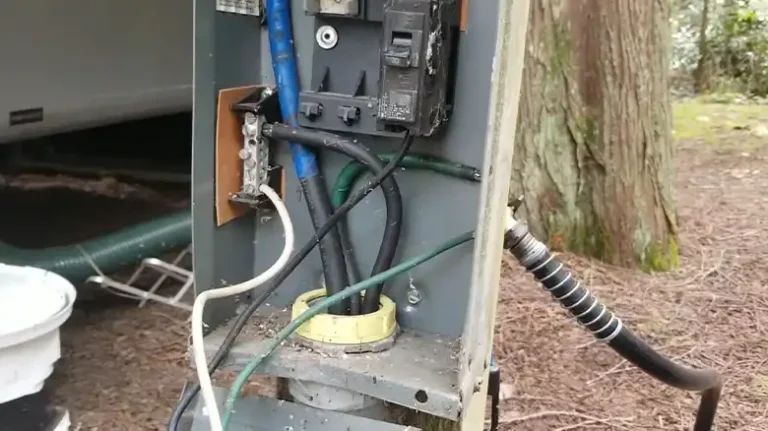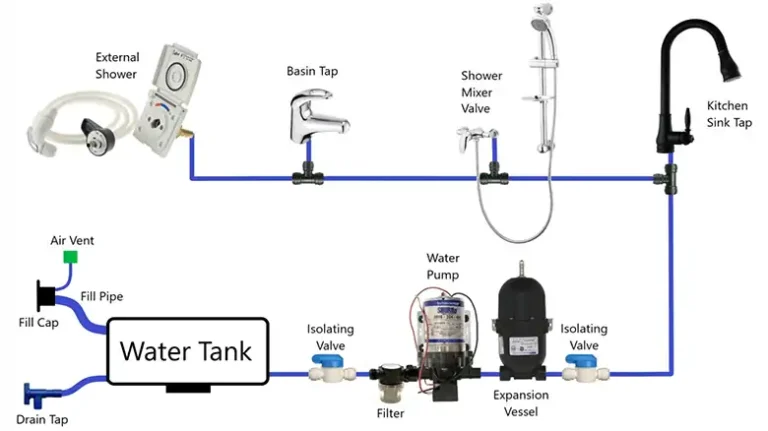Comparing Propane vs Electric RV Furnaces: Which is Better for Heating Your Recreational Vehicle?
Recreational vehicles (RVs) provide a comfortable way to travel and live on the go. An important consideration for any RV owner is the furnace system that provides interior heating. The two main options are propane furnaces and electric furnaces. Deciding between propane and electric RV furnaces can impact your camping experience.

An Overview of RV Furnaces that Run on Propane and Electricity
Propane and electric furnaces both offer effective heating solutions for RVs. However, they operate in different ways and have advantages and disadvantages.
Propane furnaces burn liquefied petroleum gas to generate heat. The combustion process occurs inside a sealed chamber or heat exchanger. This heat then transfers to the air blown through your RV ductwork by a fan or blower.
In contrast, electric RV furnaces use heating elements that warm up to high temperatures when electricity passes through them. Blowers circulate the hot air into living areas. Electric models operate on shore power connections to campground electrical outlets or generator power.
Choosing between the two main entails understanding factors like efficiency, performance, costs, infrastructure needs, environmental impact, availability, maintenance, and the overall user experience for RV living comfort.
Fuel Efficiency and Cost-Effectiveness
A significant consideration for RV owners is propane versus electric heating systems’ fuel efficiency and ongoing costs.
Propane furnaces offer 80-90% fuel efficiency rates. This means up to 90% of the propane fuel converts into usable heat. Whereas electrical furnaces offer 100% efficiency.
However, propane also costs less per BTU (British Thermal Unit) than electricity. Based on 2022-2023 rates, propane ranged from $2.426 to $2.675 per gallon. One gallon of propane equals about 91,452 BTUs. Comparatively, 1000 watts of electric power equals 3412 BTUs, at an average rate of 23 cents per kilowatt-hour.
Let’s do a little math to find the price comparison between electric furnaces and propane furnaces.
First, let’s find out the ratio first, Propane Electricity = 914523412 = 26.8. So, 1 gallon of propane gas is equal to 26.8 times of 1 kWh electricity! If you want to do the price comparison then, 1 gallon of propane gas will cost $2.426 (as of now, 20th of November), and the cost of the electricity will be ( 26.8 * $0.23) = $6.614
However, electric systems can operate for lower overall costs in some scenarios. For example, if camping with shore power connections, relying more on electricity saves money otherwise spent on propane tanks. But with generator-only power, the generator fuel costs could exceed installing more propane capacity.
Carefully calculating your actual heating requirements for different trips can illuminate true costs. Additionally, investing upfront into a more expensive, higher-efficiency appliance could pay off long-term.
Heating Performance
When choosing between a propane and electric RV heating system, it’s crucial to consider heating performance metrics like speed, capacity, and consistency. Propane systems generally excel in speed, quickly warming up the RV’s interior, especially in cold weather conditions. Propane furnaces also provide a more consistent stream of heat as the combustion process continuously generates new heat, unlike electric elements that cycle on and off. This consistent heating proves particularly beneficial when camping in frigid climates.
However, electric RV heating systems offer certain advantages as well. The latest technologies, such as mic athermic heating panels, boast slim form factors that conserve interior space compared to bulky propane furnaces. Electric heaters also operate significantly quieter, eliminating the blower fan noise associated with gas furnaces. Additionally, precise electric heaters that utilize space-saving technologies like oil-filled radiators provide more zone heating control compared to central ducted systems.
Propane Heating Performance:
Speed: Propane furnaces heat air from 130°F to 140°F and operate in short intervals to minimize operating costs.
Capacity: Propane systems effectively heat larger RVs and provide consistent warmth in cold weather.
Consistency: The combustion process continually generates new heat, resulting in a steady stream of warmth.
Electric Heating Performance:
Speed: Electric heat pumps produce heat below body temperature (98.6°F), so the air may feel cool initially.
Capacity: Electric systems may struggle to heat larger RVs or maintain consistent warmth in extreme cold.
Consistency: Electric elements cycle on and off, potentially creating fluctuations in heat output.
Installation, Infrastructure, and Compatibility
The installation requirements also differ between propane and electric RV furnaces.
Gas appliances need proper roof or side exterior venting for combustion gases. The furnace combustion chamber also connects via gas lines to the propane tank. However, propane tanks, regulators, and lines come standard on most RVs.
Installing electric systems mainly involves access to power outlets and wiring connections. But infrastructure poses one of the largest constraints. You either need shore power hookups or robust generator/battery capacities while traveling off-grid. Running an electric furnace for hours can quickly drain batteries without recharging solutions.
Fortunately, you can outfit your RV with both systems to provide backup heating options when lacking propane or electric sources. Having a dual-fuel setup also grants more flexibility in different camping scenarios. For example, electric heaters prove useful while boondocking when avoiding generator noise or propane odors is preferable.
Environmental Factors
For eco-conscious RV owners, assessing the respective environmental impacts also holds importance.
Propane does produce greenhouse gases from combustion, unlike electric heating. However, propane emits much fewer emissions than alternative fossil fuels. About 11% of residential carbon monoxide emissions in the USA come from recreational vehicle use, according to the EPA.
Meanwhile, electric RV furnaces have zero direct emissions. However, the upstream electricity generation could still rely on fossil fuels. Even solar or wind-powered generators have an embodied carbon footprint from raw material extractions.
Conscientious RV owners can reduce environmental impacts by installing solar panels, using shore power when possible, minimizing propane use, and replacing old appliances with high-efficiency furnace models.
Heating System Availability and Accessibility
The accessibility of propane and electric power also factors into your RV heating decisions.
Propane accessibility relies on having a sufficient gas supply in your tank plus locations to refill along your route. Occasionally, you may encounter limitations in replenishing propane tanks in certain areas. There is also some inconvenience in manually refueling (and the smell of propane!).
For electric furnaces, accessibility depends wholly on shore power or generator access. Boondocking locations lack hookups. And running a generator non-stop for electric heating can disturb neighbors in tight RV camps.
Installing both systems provides maximum flexibility in more off-grid scenarios. Having backup heating options prevents getting stuck with no heat due to accessibility constraints.
Maintenance and Repair Considerations
The general maintenance and potential repair requirements differ slightly between propane and electric RV furnaces.
Gas furnaces need occasional cleaning if combustion residues build up within the exhaust venting. The propane lines and fittings may also need inspections and leak tests before each trip. Impellers on blower fans can wear out over many heating seasons. And if burners require repair, specialized propane appliance technicians handle gas system fixes.
Electric furnace maintenance mostly includes cleaning or replacing air filters and ensuring electrical connections stay intact. Heating elements and fans can wear out over time too. Thankfully, repairing most electric systems does not require specialized tradespeople.
Following the manufacturer servicing recommendations goes a long way to prevent issues for either system. But unexpected repairs always remain a possibility on the road. Having backup heating provides a critical buffer when equipment inevitably fails.
If you are thinking about the lifespan of these two furnace systems, then the electrical one can survive more than the furnace system! On average, the electric furnace system has a life span of 20 to 30 years whereas the furnace system has 15 to 20 years!
User Comfort and Convenience
The user experience comfort and convenience also sway decisions between propane vs electric RV heating.
Propane furnaces deliver strong heating capacities even in frigid conditions. Once filled, propane tanks offer a large onboard capacity for self-contained heating. However, the noise from strong blower fans annoys some users, especially when trying to sleep. Propane also carries a noxious rotten egg smell you must avoid releasing inside an RV.
Electric heating offers ultra-quiet operation without fumes or combustion residuals inside your living space. Highly effective technologies like micathermic heaters also warm rooms rapidly without choppy temperature spikes. However, relying solely on electricity makes you dependent on shore power or battery capacities. Running out of “fuel” can leave you unexpectedly cold.
Having the ability to alternate between multiple heating sources provides the best adaptability for user comfort. You can optimize heating strategies based on ambient conditions, power availability, and personal preferences.
Considerations for Making the Decision between Propane and Electric RV Furnace
With many factors to weigh between propane and electric RV furnaces, the best decision depends mainly on your typical travel scenarios.
For RV travelers who frequently have electric hookups at campsites, investing in efficient electric heating and micathermic technologies offers convenience and environmental gains. However, having backup propane capacity still proves useful whenever needing generator-free heat.
For remote or winter boondockers, propane often makes the most sense as the primary heating source. But bringing along a supplemental electric heater still provides flexibility whenever excessive generator noise or propane odors become bothersome for interior living spaces.
Carefully assessing your usual RV locales, heating requirements, costs, and personal comfort preferences illuminates the ideal balance of propane and electric capacities tailored to your situation.
No singular heating option checks every box. Combining the advantages of both propane and electric systems, when feasible, provides the most versatility for seamless off-grid living.
Summary
| Category | Propane | Electric |
| Fuel Efficiency | 80-90% | 100% |
| Cost per BTU | Cheaper | More expensive |
| Heating Performance | Faster, more consistent | Quieter, more zonal control |
| Installation | Vents and gas lines | Wiring and outlets |
| Infrastructure Needed | Tanks and refueling | Shore power or generator |
| Environmental Impact | Produces emissions | Depends on electricity source |
| Availability | Tanks may need refilling | Needs outlets or generator fuel |
| Maintenance | Occasional vent cleaning | Replace filters |
| Repairs | Specialized technicians | DIY possible |
| User Experience | Strong heating, noisy | Ultra-quiet, battery dependent |
Parting Thoughts
With many factors impacting decisions between propane vs. electric RV furnaces, carefully weigh your expected heating requirements, usage factors, costs, and convenience considerations. Installing adequate capacities of both systems often delivers the most versatile off-grid comforts and backups for stress-free travels.
Hopefully, this furnace comparison has provided useful insights to help determine the best RV heating solutions to match your travel goals and preferences. Please leave a comment below with any additional questions as you map out the ideal setup enabling your upcoming adventures on the open road!

![[4 Fixes] Dometic Rv Toilet Won’t Fill With Water](https://www.exploringthelocallife.com/wp-content/uploads/2023/08/dometic-rv-toilet-won_t-fill-with-water-768x431.jpg)





